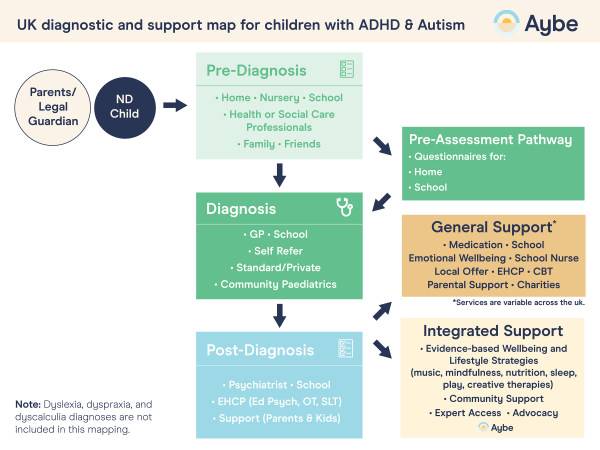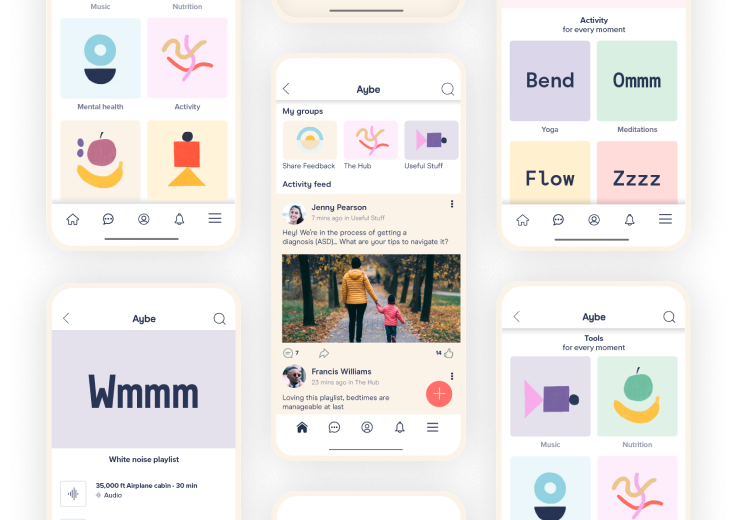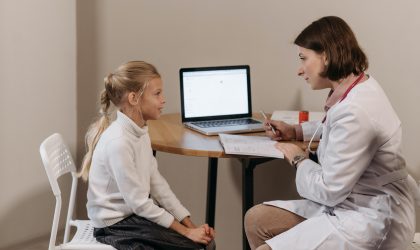Support for Kids Before and During Their Autism and ADHD Assessment in the UK

Where are you on your journey to support your child’s neurodiverse diagnosis in the UK? We created a diagnostic and support map to help parents understand the situations they may encounter before, during to after diagnosis in the UK. This first part is going to dive into what support is available before and during an ADHD or autism assessment.
The UK diagnostic and support map for children with ADHD & Autism was co-developed by Dr Joanne Steer and Dr Samantha Hiew, illustrating the journey parents or guardians tend to take to obtain diagnosis and support for their neurodivergent children in the UK.
Join the Community
Download the app to access more specialist advice, community support and wellbeing tools.
Join today as a Contributor member to gain free* access!
Download now
*Free access, in return for contributing to Aybe on a weekly basis, for example by commenting, liking, responding to feedback requests. See Terms & Conditions.

This is a general map and many local areas have specific nuances in how their services are provided.

UK diagnostic and support map for children with ADHD & autism, co-developed by Dr Joanne Steer, Consultant Clinical Psychologist, and Dr Samantha Hiew
Support Whilst Waiting for an ADHD or Autism Assessment
The family’s first exposure to challenges associated with neurodivergence usually begins within home, school or social life. Sometimes professionals such as health, social care, and others working with the children highlight the concerns.
Professionals or families spot early signs in nursery, childminders, or school, e.g., autistic children with significant socio-communication challenges.
Even without a diagnosis, children can be referred to specialist services such as Speech and Language Therapist (SLT) or Community Paediatrics. Education providers can begin to put support in place around a child’s needs in school via inclusive Quality First Teaching.
In some areas, parents can also access support from the voluntary sector or parent support groups prior to an assessment.
What You Need to Know About The Process of Getting a Diagnosis
Parents can typically obtain a referral to assessment clinics via a GP, school or other professional. In some areas, parents may also self-refer for neurodevelopmental assessments.
Prior to referral, a pre-assessment screening takes place. The screening typically involves sending questionnaires to the child’s school and home for completion. These questionnaires evaluate whether concerns exist pervasively across different settings and not just within the school or home.
When a referral has been made, the diagnostic team will assess the child based on standardised tools for diagnosis that meet the NICE guidelines (for autism, ADHD). The assessment considers the information that the school and parents gather.
According to the NICE guidelines, only multidisciplinary teams should perform autism assessments. This could include psychologists, nurses, SLTs, psychiatrists, or pediatricians. However, Professionals can also perform ADHD assessments. That is a psychiatrist, nurse or Clinical Psychologist who has extensive experience of ADHD.
Due to lengthy waiting times in some areas, parents can consult private clinicians or clinics that comply with NICE guidelines.
Want to know how to support your child after they receive their neurodiverse diagnosis? Check out the next part of this series What Support is Available After an Autism & ADHD Diagnosis in the UK.
The route to getting a diagnosis can often take months, if not years. While you are waiting, why not download our app to connect with like-minded parents who may be a source of validation, support and help or browse our free Music play list which provides comfort and calm?
Join the Community
Download the app to access more specialist advice, community support and wellbeing tools.
Join today as a Contributor member to gain free* access!
Download now
*Free access, in return for contributing to Aybe on a weekly basis, for example by commenting, liking, responding to feedback requests. See Terms & Conditions.

An Important Note: Our initial focus here at Aybe is on some of the most common genetically inherited neurodivergent conditions, such as Autistic Spectrum Condition and ADHD, but we’d love to hear your stories and your requests and feedback on any area you’d like to have more information on as we grow. Let us know what you think in the comment section below or post in our community groups.





